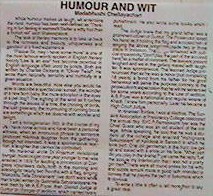Other than Music
Madabhushi Chellayya Chari
Vinjamuri was not just a musician and a musicologist. He was an all rounder with deep knowledge in religion, politics, literature, linguistics and a host of other subjects. In late twenties and early thirties, even as a teenager, Vinjamuri was an active participant in the National Independent movement. Madabhushi Chellayachari, nephew of Vinjamuri (his sister Alamelu’s son), while writing an article about ‘Humour and Wit’ in New Swatantra Times, February 2003 (Page 27) mentioned an incident that occurred in 1932 when Vinjamuri was arrested for sedition. Here a humorous excerpt from what he wrote:

I am a nonagenarian (90). In the course of my life I have come across and have been a personal witness when an innocuous phrase or sentence produced hilarious laughter from the gathering, though not intended. It was a spontaneous reaction, a laughter that cannot be controlled.
My maternal uncle, Dr. Vinjamuri Varadaraja Iyengar, musicologist (one year younger to me) was arrested in 1932 for leading a procession of congress volunteers daily, both in the morning and evening, for nearly two months, with a flag and singing “Makoddu Tella Doratanamu” (We don’t want white men’s rule) written by Garimella Satyanarayana. He was tried by Mr. A.S. P. Iyer, then District Judge at Guntur, on charges of sedition, which carried heavy punishment. He also wrote some books, which I read.
The judge knew that my grand father was a prominent citizen of Guntur. The prosecutor raised his hand as if holding the flag and accused him of singing the above song and made two or three steps in imitation. The judge remarked with judicial impassivity, “Don’t play the part of the accused here”, as a matter of comment. The lawyers present laughed and we in the gallery roared with laughter. It was spontaneous. The learned judge pronounced that as he was a minor (not completing 18 years) a bond from his father for good behaviour would serve the purpose, contrary to the prosecution’s expectation that he will be sentenced for some years according to the law of sedition. A. S. P. Iyer was a nationalist and a regular wearer of Khadi. I knew him personally. Later, he became a high Court Judge.”